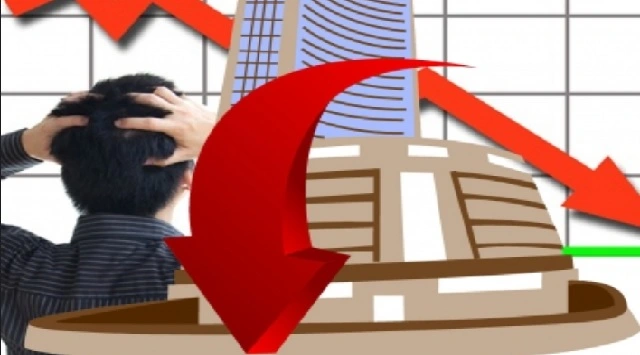12-JUN-2025,05:50PM The Indian equity markets witnessed a significant downturn on Tuesday, closing deep in the red amid growing geopolitical tensions between Iran and the United States. Heightened uncertainty in the Middle East triggered a wave of risk aversion across global markets, prompting investors to move away from equities and seek safer assets like gold and government bonds. Both benchmark indices — the Sensex and the Nifty 50 — ended the day with steep losses, reflecting investor concerns about the potential impact of geopolitical strife on global economic stability.
As fears of a larger conflict between Iran and the US intensified, market sentiment soured, and Indian equity markets joined the global sell-off. The tension added pressure to an already cautious investor outlook, compounded by volatile oil prices and fluctuations in foreign institutional investments.
Geopolitical Tensions Trigger Sell-Off in Indian Equity Indices
Iran-US Standoff Sparks Market Panic
The latest friction between Iran and the US, involving threats of military action and sanctions, has created a ripple effect throughout financial markets. Investors around the world are watching closely, anticipating that further escalation could significantly disrupt energy supply chains and international trade.
For Indian equity investors, the immediate concern revolves around oil prices and capital outflows. Since India is one of the largest importers of crude oil, any sustained rise in global oil prices could impact inflation, fiscal balance, and corporate margins — all of which weigh heavily on market performance.
Sensex and Nifty Drop as Uncertainty Reigns
On Tuesday, the BSE Sensex fell over 500 points during the trading session before closing 390 points lower at 75,100. Meanwhile, the NSE Nifty 50 slipped by 110 points to end at 22,950. Mid-cap and small-cap indices also followed suit, with most sectors finishing in negative territory.
The across-the-board decline signaled a widespread retreat from risk, with the Indian equity market reflecting the broader global jitters caused by geopolitical instability.
Sectoral Impact of Tensions on Indian Equity Performance
Financial and Auto Stocks Under Pressure
Among the worst-hit sectors in the Indian equity markets were banking and auto. Financials bore the brunt of the downturn as concerns rose about the impact of rising yields and currency depreciation. Top banks like HDFC Bank, Kotak Mahindra, and Axis Bank witnessed sharp declines.
The auto sector also faced headwinds due to fears of increased input costs, especially fuel and logistics. Shares of Tata Motors, Maruti Suzuki, and Hero MotoCorp all recorded losses amid expectations of suppressed demand and reduced margins.
Oil and IT Stocks Offer Partial Resilience
Despite the sell-off, energy stocks offered a cushion. Companies like ONGC and Reliance Industries gained ground, benefiting from the rise in global crude oil prices. The IT sector, too, remained relatively stable due to the depreciation of the Indian rupee, which enhances export revenues. Infosys, TCS, and Wipro closed flat or marginally higher, offering some relief to the Indian equity indices.
However, the gains in these sectors were insufficient to offset the broader market losses.
Investor Sentiment and Indian Equity Outlook
Market Volatility Spikes
The India VIX — a volatility index that tracks investor fear — surged over 10% during the trading session, indicating rising nervousness among market participants. Analysts noted that this jump was directly related to the uncertainty surrounding Iran-US relations and the absence of any clear de-escalation signals.
Such volatility often precedes either steep corrections or sharp recoveries, depending on how global events unfold. In the short term, the Indian equity market is expected to remain highly sensitive to international developments.
Experts Advise Caution and Long-Term Focus
Market experts have urged investors to avoid knee-jerk reactions and maintain a long-term perspective. “While geopolitical events can rattle markets in the short term, structurally strong economies like India tend to recover quickly,” said Ramesh Damani, a veteran market analyst.
He added that Indian equity investors should focus on quality stocks, strong earnings, and sectors less exposed to external shocks. Defensive sectors such as FMCG, pharma, and IT may offer relative stability during turbulent times.
Role of Foreign and Domestic Institutional Investors in Indian Equity Movement
Foreign Investors Turn Cautious
Foreign Institutional Investors (FIIs), who have been major drivers of market momentum in recent months, turned net sellers amid the global crisis. On Tuesday alone, FIIs pulled out ₹2,100 crore from Indian equity markets, indicating a flight to safety.
This reversal comes after a period of strong FII inflows and may temporarily weaken market support levels, especially in large-cap stocks. The weakening rupee, down 28 paise against the dollar, further added to their apprehension.
Domestic Funds Act as Shock Absorbers
On the other hand, Domestic Institutional Investors (DIIs) attempted to stabilize the markets by purchasing ₹1,400 crore worth of equities. Mutual funds and insurance companies increased exposure to defensive sectors and quality blue-chip names, attempting to provide some support to sagging indices.
Their participation highlights the growing importance of local investors in cushioning the Indian equity markets during global downturns.
Crude Oil and Currency Markets Add to Indian Equity Headwinds
Rising Crude Oil Prices Pose Inflation Risk
With Brent crude breaching the $90 per barrel mark, inflation concerns have once again come to the forefront. Elevated oil prices threaten to increase transport, manufacturing, and input costs, putting pressure on corporate profitability and consumer spending.
Economists believe that if oil prices remain elevated, the Reserve Bank of India (RBI) may have to reassess its monetary policy stance, which in turn could influence the performance of Indian equity markets.
Rupee Depreciation Worsens External Balance
The Indian rupee fell to 83.60 against the US dollar, affected by rising crude prices and outflows of foreign capital. A weaker rupee makes imports more expensive and adds to the fiscal burden, compounding the pressure on companies dependent on foreign raw materials or external debt.
This currency volatility further erodes investor confidence, adding to the already bearish tone in Indian equity trading.
Conclusion: Indian Equity Markets Face Short-Term Pain Amid Global Uncertainty
The sharp fall in Indian equity markets amid tensions between Iran and the US reflects the deep interlinkage between global geopolitics and domestic financial health. While India’s economic fundamentals remain sound, external shocks like war threats, oil price spikes, and capital flight can temporarily disrupt market momentum.
In the coming days, the trajectory of Indian equity markets will depend on how the Iran-US conflict unfolds, the direction of crude prices, and the stance taken by central banks globally. For now, investors are advised to remain cautious, focus on long-term goals, and brace for further volatility.
Source : ANI





